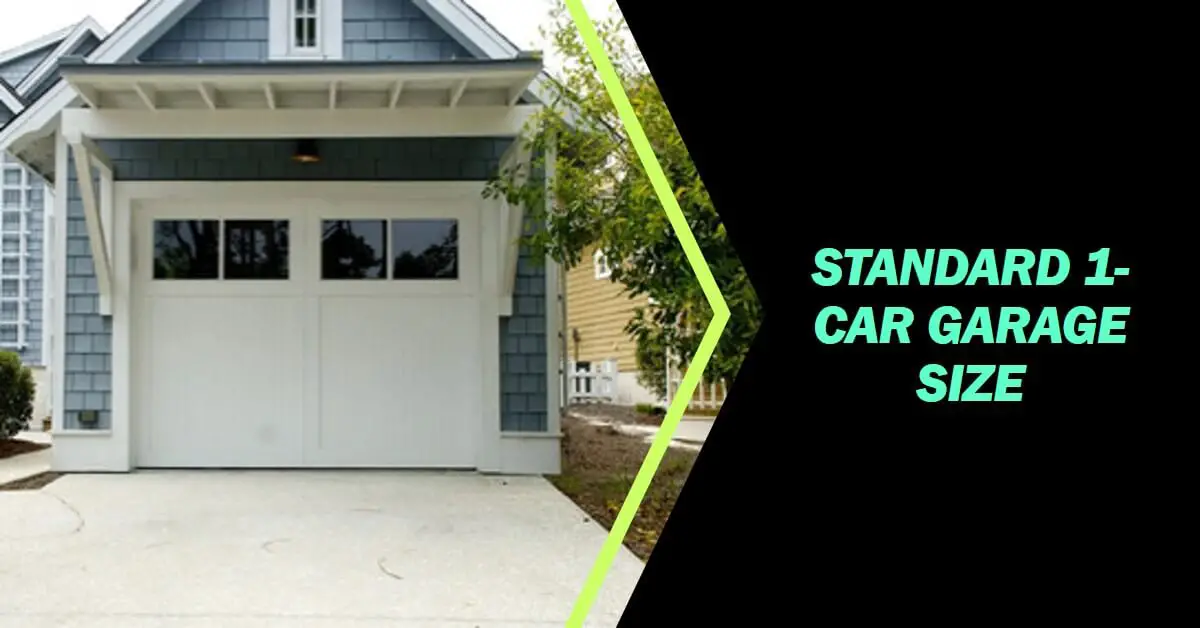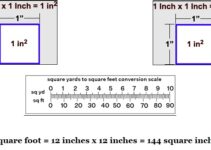Standard 1-Car Garage Size
When it comes to designing or renovating a garage, one of the most crucial factors to consider is its size.
The size of a garage plays a vital role in ensuring that it can adequately accommodate your vehicle and any additional items you plan to store.
In this article, we will explore the standard 1-car garage, including its width, depth, and door dimensions.
We will also discuss options for larger garages and provide additional sizes to consider.
Standard 1-Car Garage

The average 1-car garage size is typically 12 feet wide and 20 feet deep (12×20).
This size is generally sufficient to accommodate one full-size car, minivan, or SUV comfortably.
A single-car garage typically features a 9-foot-wide garage door, allowing ample space for vehicle access.
It’s essential to note that these dimensions can vary depending on your specific needs and preferences.
Width: 12 Feet or More
The width of a one-car garage is a critical consideration, especially if you have a larger vehicle or prefer additional space for maneuvering.
While the standard width is 12 feet, you can opt for a wider garage, such as 14 or 16 feet, to ensure more comfortable access to your vehicle.
Depth: 20 Feet or More
The depth of a one-car garage is another essential aspect to consider.
The standard depth of 20 feet provides enough space to park a vehicle comfortably while allowing room for movement and storage at the rear.
If you have specific storage needs or own a longer vehicle, you may want to consider a deeper garage to accommodate your requirements adequately.
Door Width: 8 to 10-Foot Wide
The width of the garage door is crucial for easy entry and exit. For a one-car garage, the recommended door width typically ranges from 8 to 10 feet wide.
This width ensures that your vehicle can pass through the door with ease, while also considering any additional accessories or mirrors that may extend beyond the standard vehicle width.
Read Also:
Accommodating Different Types of Vehicles
One of the primary considerations when determining the size of a one-car garage is the type of vehicle you own or plan to park inside.
While the standard dimensions mentioned earlier can accommodate most full-size cars, minivans, or SUVs, it’s essential to consider the specific dimensions of your vehicle.
If you have a larger vehicle, such as a full-size SUV or a pickup truck, you may want to opt for a wider or deeper garage.
This additional space ensures that you can open the vehicle’s doors comfortably and maneuver around it without any inconvenience.
Factors to Consider for a One-and-a-Half Car Garage
If you plan to use your garage for more than just parking a single vehicle, you might want to consider a one-and-a-half-car garage.
This type of garage offers extra space for storing tools, lawnmowers, bicycles, or other equipment while still accommodating your car comfortably.
Width: 18 Feet or More
For a one-and-a-half-car garage, the recommended width is typically 18 feet or more.
This additional width provides ample room for your vehicle and extra storage or workspace.
With a wider garage, you can set up shelves, cabinets, or workbenches on one side without compromising the parking space.
Depth: Considerations for Additional Storage Space
In addition to the width, you may also want to consider increasing the depth of your garage to accommodate additional storage.
By extending the depth beyond the standard 20 feet, you can create more room for storing equipment, tools, or even a dedicated workshop area.
This customization allows you to tailor the garage to your specific needs and hobbies.
Additional Sizes for a 1-Car Garage
In addition to the standard size for a one-car garage, there are several other common dimensions that can better suit your specific needs.
These alternative sizes provide flexibility and accommodate larger vehicles or additional storage space. Let’s explore some of these options in more detail:
- 10 feet by 18 feet (180 square feet): This slightly smaller one-car garage size is still spacious enough to comfortably fit most cars. It is a popular choice for homeowners with limited space or for those looking for a more compact garage option. Despite its smaller footprint, it provides ample room for parking and some storage.
- 12 feet by 22 feet (264 square feet): If you have a larger vehicle or require extra storage space, this size can be a great fit. It offers additional length and width compared to the standard size, accommodating larger cars, trucks, or SUVs comfortably. The extra space can also be utilized for storing tools, gardening equipment, or recreational gear.
- 14 feet by 24 feet (336 square feet): This garage size provides even more room for larger vehicles or for homeowners who require additional storage space. It offers both width and length, making it suitable for larger cars, trucks, or SUVs. With the extra square footage, you can create organized storage areas, a workshop, or even a small workspace within the garage.
- 16 feet by 24 feet (384 square feet): If you have specific needs that require a generous amount of space, this larger one-car garage size might be the perfect choice. It offers substantial room for larger vehicles and provides ample storage space for various items. With this size, you can comfortably park your vehicle, store equipment, and have a dedicated workspace or hobby area.
Remember, these alternative one-car garage sizes are just examples to help you envision the range of possibilities. Customization is always an option, allowing you to tailor the dimensions to your specific requirements and preferences.
Read Also:
How Many Square Feet is a 1 Car Garage
Conclusion
Designing a 1-car garage involves careful consideration of the dimensions that best suit your needs.
While the standard size of a one-car garage is typically 12 feet wide and 20 feet deep, it’s essential to remember that these dimensions can be customized based on your preferences, available space, and specific requirements.
The width of the garage is an important factor to consider, as it determines the ease of access and maneuverability.
While the standard width is 12 feet, opting for a wider garage, such as 14 or 16 feet, can provide more space for comfortably opening vehicle doors and moving around the parked vehicle.
The depth of the garage is equally crucial. A 20-foot depth is sufficient for parking a vehicle comfortably, but if you have additional storage needs or a longer vehicle, considering a deeper garage can provide the extra space you require.
Furthermore, the width of the garage door is an essential consideration.
A door width ranging from 8 to 10 feet ensures that your vehicle can easily enter and exit the garage without any hindrance, accommodating any accessories or mirrors that may extend beyond the standard vehicle width.
If you have additional storage requirements or plan to use your garage for more than just parking your vehicle, a one-and-a-half-car garage might be the right choice.
With a width of 18 feet or more and considerations for additional depth, this type of garage offers extra space for storage, workspace, or accommodating larger vehicles comfortably.


